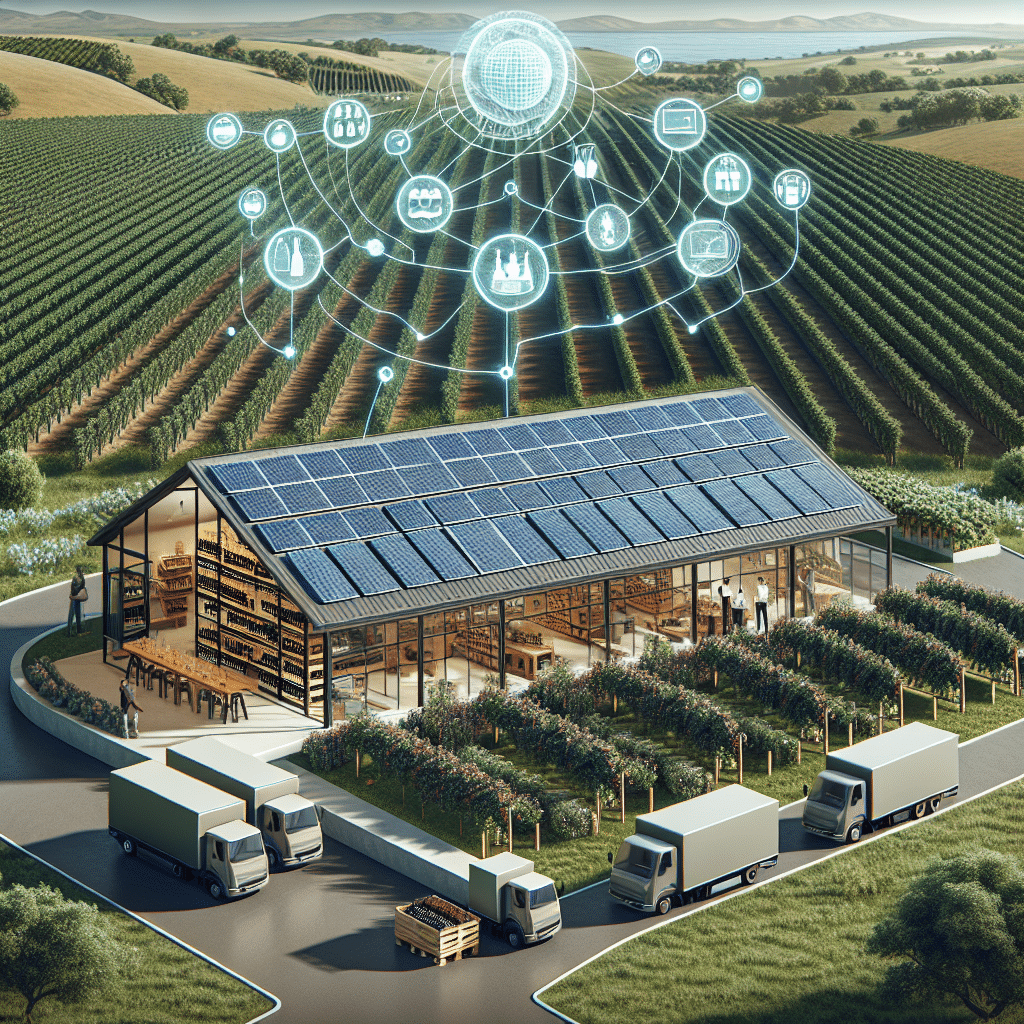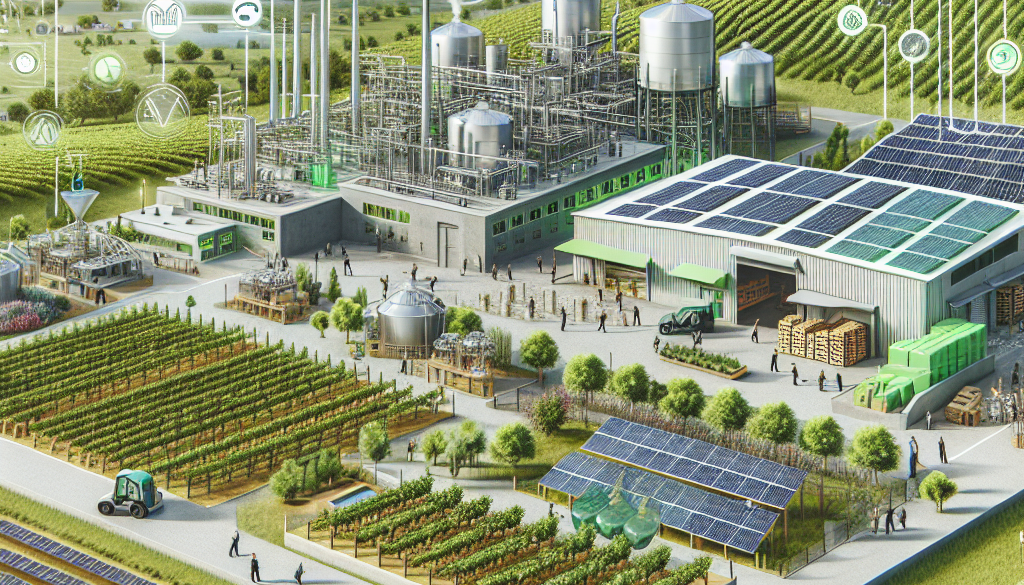Incorporating Greener Network Designs Into Our Wine & Spirits Business
-
Table of Contents
- Incorporating Greener Network Designs in Wine & Spirits Businesses
- The Need for Sustainability in the Wine & Spirits Industry
- Strategies for Greener Network Designs
- Optimizing Supply Chain Logistics
- Adopting Renewable Energy Sources
- Implementing Sustainable Packaging Solutions
- Water Management and Waste Reduction
- Building Sustainable Relationships with Stakeholders
- Case Studies and Success Stories
- Challenges and Considerations
- Conclusion
- Discover ETprotein’s Eco-Friendly Protein Products
Incorporating Greener Network Designs in Wine & Spirits Businesses

The wine and spirits industry is not just about crafting intoxicating beverages; it’s also about the intricate network that brings these products from vineyards and distilleries to consumers’ glasses. As the world becomes increasingly eco-conscious, businesses within this sector are under pressure to adopt greener practices. This article explores how wine and spirits businesses can integrate environmentally friendly network designs to reduce their carbon footprint and contribute to a more sustainable future.
The Need for Sustainability in the Wine & Spirits Industry
The global wine and spirits market is vast, with an estimated value of over $1 trillion. However, this industry also has a significant environmental impact, from water usage in production to greenhouse gas emissions from transportation. According to the International Organisation of Vine and Wine (OIV), the wine industry alone is responsible for around 0.1% of global CO2 emissions. While this may seem small, every industry’s contribution to climate change is critical, and the wine and spirits sector is no exception.
Strategies for Greener Network Designs
Implementing greener network designs involves a multifaceted approach that touches on various aspects of the business. Here are some strategies that wine and spirits companies can adopt:
Optimizing Supply Chain Logistics
Transportation is a major contributor to any product-based industry’s carbon footprint. By optimizing logistics, companies can reduce the number of miles products travel, thereby lowering emissions. This can be achieved through:
- Local sourcing of materials and ingredients
- Consolidating shipments to minimize transport frequency
- Choosing transportation methods with lower carbon footprints, such as rail over road
- Implementing route planning software to find the most efficient paths
Adopting Renewable Energy Sources
Transitioning to renewable energy sources for production facilities and warehouses can significantly reduce a company’s carbon emissions. Solar panels, wind turbines, and biomass energy systems are viable options for the industry. For instance, some wineries have already started using solar power to run their operations, leading to a substantial decrease in their reliance on fossil fuels.
Implementing Sustainable Packaging Solutions
Packaging plays a crucial role in the wine and spirits industry, but it also contributes to waste and environmental degradation. Companies can switch to:
- Recycled or biodegradable materials for bottles, boxes, and labels
- Lightweight packaging to reduce shipping weight and, consequently, emissions
- Refillable bottle programs to encourage reuse among consumers
Water Management and Waste Reduction
Water is a precious resource in the production of wine and spirits. Efficient water management systems can help conserve water, while waste reduction initiatives can minimize the environmental impact of production. This includes:
- Recycling water used in production processes
- Implementing dry farming techniques in vineyards
- Composting organic waste and using it as fertilizer
Building Sustainable Relationships with Stakeholders
Collaboration with suppliers, distributors, and customers who also prioritize sustainability can amplify a company’s green efforts. This involves:
- Partnering with eco-friendly suppliers and distributors
- Engaging customers through sustainability campaigns
- Joining industry-wide sustainability initiatives and certifications
Case Studies and Success Stories
Several wine and spirits companies have already made strides in greener network designs. For example, a prominent California winery reduced its carbon emissions by 30% after installing solar panels. Another spirits brand switched to 100% recycled glass bottles, saving approximately 400 tons of waste annually.
These success stories not only demonstrate the feasibility of greener practices but also highlight the potential for cost savings and improved brand image, which can lead to increased customer loyalty and market share.
Challenges and Considerations
While the benefits of greener network designs are clear, there are challenges to consider:
- Initial investment costs for renewable energy and sustainable materials
- Ensuring the quality and integrity of products during transportation
- Adapting to local regulations and sustainability standards
- Measuring and reporting on sustainability efforts accurately
Despite these challenges, the long-term benefits of sustainability for the environment, society, and the business itself make these efforts worthwhile.
Conclusion
Incorporating greener network designs into the wine and spirits business is not just a trend but a necessity in the face of climate change. By optimizing supply chains, adopting renewable energy, implementing sustainable packaging, managing resources efficiently, and building sustainable relationships, companies can make a significant impact. The journey towards sustainability is complex, but with the right strategies and commitment, the wine and spirits industry can contribute to a greener future while enhancing their brand and bottom line.
Discover ETprotein’s Eco-Friendly Protein Products
As wine and spirits businesses strive for sustainability, they can also benefit from partnering with suppliers who share their environmental values. ETprotein offers a range of organic bulk vegan proteins and L-(+)-Ergothioneine that are non-GMO and allergen-free, perfect for companies looking to incorporate sustainable ingredients into their products. With a commitment to quality and eco-friendly practices, ETprotein is an ideal partner for businesses on their journey to greener operations.
About ETprotein:
ETprotein, a reputable protein and L-(+)-Ergothioneine (EGT) Chinese factory manufacturer and supplier, is renowned for producing, stocking, exporting, and delivering the highest quality organic bulk vegan proteins and L-(+)-Ergothioneine. They include Organic rice protein, clear rice protein, pea protein, clear pea protein, watermelon seed protein, pumpkin seed protein, sunflower seed protein, mung bean protein, peanut protein, and L-(+)-Ergothioneine EGT Pharmaceutical grade, L-(+)-Ergothioneine EGT food grade, L-(+)-Ergothioneine EGT cosmetic grade, L-(+)-Ergothioneine EGT reference grade and L-(+)-Ergothioneine EGT standard. Their offerings, characterized by a neutral taste, non-GMO, allergen-free attributes, with L-(+)-Ergothioneine purity over 98%, 99%, cater to a diverse range of industries. They serve nutraceutical, pharmaceutical, cosmeceutical, veterinary, as well as food and beverage finished product distributors, traders, and manufacturers across Europe, USA, Canada, Australia, Thailand, Japan, Korea, Brazil, and Chile, among others.
ETprotein specialization includes exporting and delivering tailor-made protein powder and finished nutritional supplements. Their extensive product range covers sectors like Food and Beverage, Sports Nutrition, Weight Management, Dietary Supplements, Health and Wellness Products, and Infant Formula, ensuring comprehensive solutions to meet all your protein needs.
As a trusted company by leading global food and beverage brands and Fortune 500 companies, ETprotein reinforces China’s reputation in the global arena. For more information or to sample their products, please contact them and email sales(at)ETprotein.com today.












